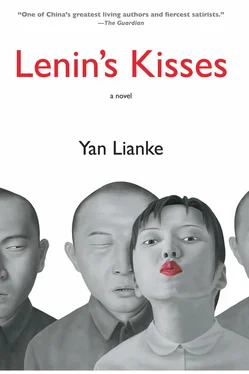After the birth, Jumei’s mother, Mao Zhi, went to the commune to look for Cadre Liu. Given Liu’s willingness to promote soc-ed in remote mountainous villages like Liven, he had become recognized as the most outstanding soc-ed cadre in the commune — or perhaps the entire county — and consequently was no longer charged with such lowly tasks as sweeping the courtyard or boiling water, and instead had become a prominent national cadre. Therefore, shortly after Mao Zhi arrived at this commune that functioned as the township office to look for him, she promptly turned around and returned home. When she arrived at her daughter’s bedside after having spent two days on the road, she said only one thing — that Liu Yingque had died, having been crushed like a pancake after falling into a ravine while promoting soc-ed in the countryside.
Further, Further Reading:
1) Soc-school babe.This was a designation that dated from when Chief Liu was a child, and was the product of several unforgettable pages from the history of the nation. Soon after the founding of new China, there began to appear many socialist academies and cadre training centers, which developed into Party institutes or Marxist-Leninist academies. People called these institutions socialist schools, or soc-schools, and within a decade they could be found in every city and county, with some provinces and districts having as many as three or four of them. Some continued to be called socialist education institutes, but most were referred to simply as soc-schools.
The Shuanghuai County Institute was known as a soc-school. It was located in a field to the north of the city and consisted of several red-tiled buildings arranged around a white-brick courtyard. This school was founded in the early years of the People’s Republic, and the county’s Party secretary doubled as the school president, while the county chief served as the school’s vice president. Cadres from throughout the county regularly came to study, and anyone who wanted to be promoted had to study for three to six months. There were also periods, however, when attendance was very light. The school had only one full-time teacher, whose name was Liu, and all of the other classes were taught by the secretary, the county chief, and various visiting experts. During the farming season, the government wouldn’t initiate many new policies and movements, and therefore the school would send all of its employees home to tend their crops, leaving only Teacher Liu to oversee the premises.
Liu Yingque had grown up in this school, and had been adopted by Teacher Liu.
That was the gengzi year, 1960, or the first of what people subsequently referred to as the Three Years of Natural Disasters, when the entire country endured a series of nightmarish famines. The county stopped sending cadres and Party members to the Shuanghuai soc-school, and the cadres and teachers who were already there were told to return home, leaving only Teacher Liu and his young wife. One day after the forty-year-old Teacher Liu and his wife had gone out to forage for wild plants, they returned to the freezing-cold school and discovered a bundle next to the door, inside which there was a several-month-old infant so emaciated that its legs were as thin as its arms. Teacher Liu and his wife turned back toward the fields and began cursing:
Damned father! Damned mother! Did you leave your child on our doorstep to die?
If you have any conscience at all, you’ll take your child. We’ll even give you a quart of sorghum if you do.
Are you really dead? If so, you didn’t deserve to die a good death, and may your corpse be dug up by hungry dogs and wolves.
By the time Teacher Liu and his wife finished cursing, the sun had already set behind the mountains and the fields were once again shrouded in darkness. Teacher Liu’s wife wanted to toss the baby into the field, but he wouldn’t hear of it. Years earlier, when the Eighth Route Army had passed through Shuanghuai, they needed to hold an urgent training course for Party members, and since Teacher Liu had good handwriting they appointed him — despite his “rich peasant” background — to be their transcriber. Liu was subsequently admitted into the Party, and following the defeat of the Nationalists in the jichou year and the founding of a new China, Teacher Liu’s boat was lifted by this rising tide and he was promoted to the position of secretary of the county chief. When the Shuanghuai soc-school was established a few years later, Liu became the school’s only full-time teacher. So, therefore, as a Party member, cadre, and intellectual, how could Teacher Liu permit his wife to throw out a living child? Accordingly, he took the baby from her and proceeded to raise it as his own.
The boy survived, and was given the surname Liu. Since there were sparrow hawks circling around overhead when Teacher Liu found the bundle, he decided to name the child Yingque, or “sparrow hawk.”
The famine eventually subsided, and the Shuanghuai county soc-school once again became a flurry of activity. Party members and cadres from throughout the county — and sometimes even from neighboring counties — began returning to the school. Each day that the school’s brick chimney was spitting out red flames and billows of black smoke, Liu Yingque could go down to the school canteen to eat. Everyone knew Yingque was the abandoned child Teacher Liu had found outside his door, and since those studying at the school were all cadres and Party members — which is to say, enlightened and kindhearted people who had devoted their lives to struggling on behalf of the Party — they felt it was perfectly appropriate for the child to come eat in the canteen as he wished.
As a result, Liu Yingque did not merely survive, he thrived.
He would carry his bowl to the canteen when it was time to eat, and when the cadres were finished he would follow them to the classroom, sitting on a little stool in the back of the room. At night, he would retire to a small room in the school’s storage area and go to sleep.
When Liu Yingque was six, Teacher Liu’s wife gave birth to a girl. It was said that she had married Teacher Liu — who was more than ten years her senior — precisely because she could no longer bear children. Who would have thought, therefore, that Teacher Liu would manage — at the age of forty-seven — to get her pregnant? Once she had her own daughter, her attitude toward Yingque became increasingly cold, until eventually he was forced to eat at the school canteen every day. All of the cadres and Party officials regarded him as a son of the school, to the point that many of them stopped calling him by his name and instead referred to him as “soc-school child” or “soc-school babe.” When Yingque was twelve, Teacher Liu’s wife left their daughter behind and ran away with a man from another county who had come to study at the school, and it was only then that Teacher Liu truly accepted Yingque as his own son and proceeded to raise him as the elder brother of his daughter.
3) Soc-ed.A technical term referring to the socialist education movement. Soc-ed cadres.those who were charged with implementing the socialist education movement.
CHAPTER 1: LOOKING AT THIS PERSON, THIS OFFICIAL, THIS CHIEF LIU
The snow finally stopped falling. Like a visitor who had dropped by Balou and decided to cool his heels for a week, the snow eventually got up and departed.
No one knew where it went.
Summer returned to the mountains and the village.
Читать дальше












